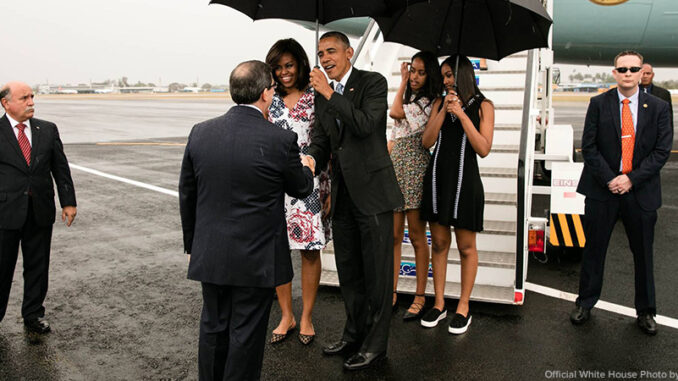
It’s been more than a year since btw brought you news of President Obama’s announcement of the U.S. foreign policy shift regarding our neighbor, Cuba. Last month, the president and his family made a three-day visit that marked the first time an American president has set foot on the island in nearly 90 years. (The last was Calvin Coolidge in 1928.) They were joined on the trip by several members of Congress (including Republicans), U.S. business leaders, and the widow of late baseball legend Jackie Robinson.
A Packed Agenda
The Obama’s visited the newly reopened American Embassy, before traveling to Old Havana to meet with the archbishop who assisted Pope Francis in fostering the 2014 agreement to restore diplomatic relations between the two countries. President Obama met with anti-government activists to talk about human rights abuses. The American guests attended a state dinner held in their honor, and took in an exhibition baseball game between the Cuban national team and the Tampa Bay Rays. News of the attack on Brussels came shortly before the game began. Critics—especially GOP candidates Donald Trump, John Kaisch, and Ted Cruz—believed the president should have returned home immediately. Obama defended his actions, saying that, “the whole premise of terrorism is to try to disrupt people’s ordinary lives.”
In public remarks before the Cuban people, Obama acknowledged the long history of conflict between the nations. He said that he came to “bury the last remnant of the Cold War in the Americas” as well as, “extend the hand of friendship to the Cuban people.” He also made clear that there are fundamental differences between the governments and economies. Despite those differences, new education, health and agriculture initiatives have begun. In answering the question, “why now?” the president answered that what we (the U.S.) were doing was not working. He also quoted Martin Luther King Jr., calling the moment, “the fierce urgency of now.”
Fidel Responds
During his visit, Obama did not meet with, nor mention the name of, current Cuban president Raul Castro’s brother, Fidel. In 2008, the famous dictator who led Communist Cuba for nearly 50 years officially resigned from power. However, the 89-year-old maintains a high profile among the Cuban people. Shortly after the visit between his brother and the American president, Fidel published a scathing 1,500-word letter titled, “Brother, Obama,” in state media. In it, he reminded the Cuba people of U.S. aggression against the country, including the trade embargo and the 1961 Bay of Pigs attack. He also offered a point-by-point criticism of Obama’s speech, but also acknowledged that the president’s, “conduct was correct.”
